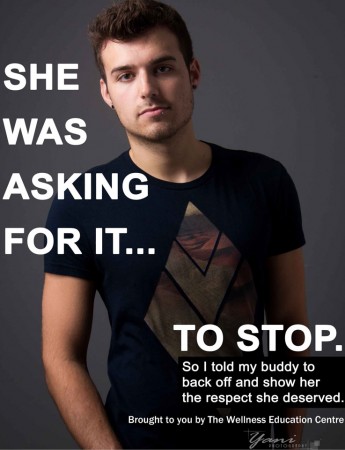
If you were witness to a conflict or unacceptable behaviour, would you take steps that can make a difference? A program at U of G is giving students the tools and training to take action as a bystander.
The murder of Kitty Genovese in 1964 is a well-known example of the “bystander effect”: Genovese was stabbed to death on a New York street while many watched from their apartment windows or heard her screams, but no one called the police or intervened. The notoriety of that case led to considerable research on bystander behaviour.
“There are lots of reasons why people don’t intervene when they see something happening,” says Melanie Bowman, manager of U of G’s Wellness Education Centre. “One is that people don’t know how.”
To help turn passive bystanders into active ones who know how to intervene, a comprehensive active bystander program has been developed by Bowman and representatives from Student Wellness Services, Student Housing Services, Student Life, Interhall Council, the Central Student Association and the Gryphons varsity football team.
Bowman says U of G’s program is unique — other programs the group investigated didn’t cover all the areas they wanted to include.
“Some focus only on sexual assault or partner abuse,” she says. “We wanted to cover those, but we also wanted to have alcohol abuse and mental health concerns on students’ radar, so we developed our own program.”
The program includes a one-hour training program for students in leadership roles, varsity athletes and Residence Life staff, and any other interested students. The training gives students options to consider in different situations. “It’s very skills-based, very practical,” says Bowman.
She describes the five steps of response:
- Decide: Is the situation something that requires an intervention? What are my options?
- Delegate: Can I call the police, talk to a bouncer in the bar or talk to my residence assistant?
- Distract: Can I intervene without “calling the person or situation out?” For example, could you approach someone who has had too much to drink and say, “We’re all taking a cab home, do want to come with us?”
- Direct: Do I need to be direct with this person? For example, “I’ve noticed that you rarely come out of your room lately and you’re not eating with us. Are you okay?”
- Debrief: No matter how you decided to intervene, talking over the situation with the appropriate person can help you understand what happened and how you might respond in the future.
Earlier this fall, posters reminding students about the importance of stepping up in these situations were posted across campus, and in bars and other locations in downtown Guelph that are popular with students. A video is also being created.
“This program is part of our ‘I am a Gryphon’ campaign, developing a campus culture,” says Bowman. “Being a Gryphon means being respectful and caring towards other Gryphons, both on and off campus. Becoming an active bystander is a natural extension of that.”